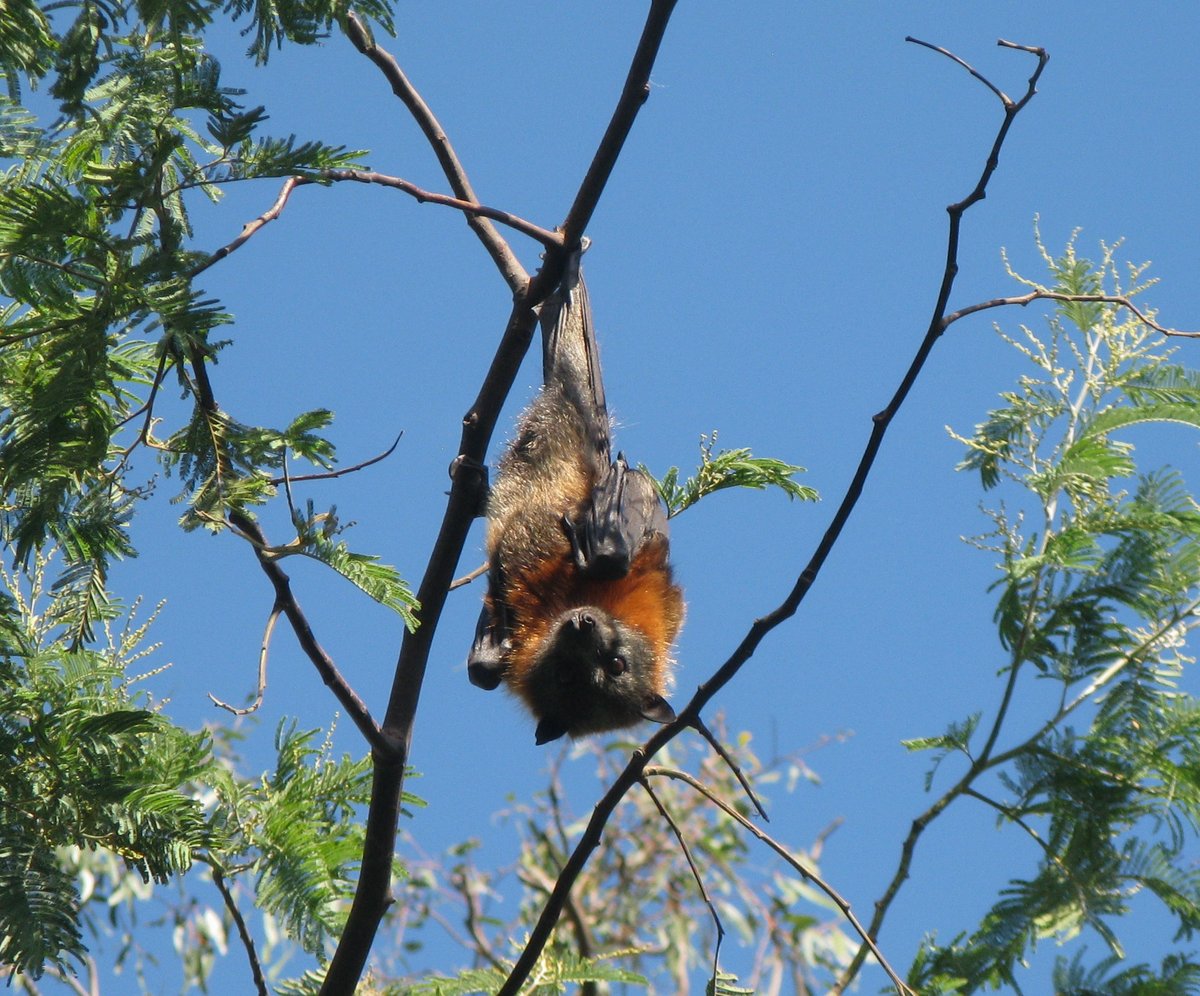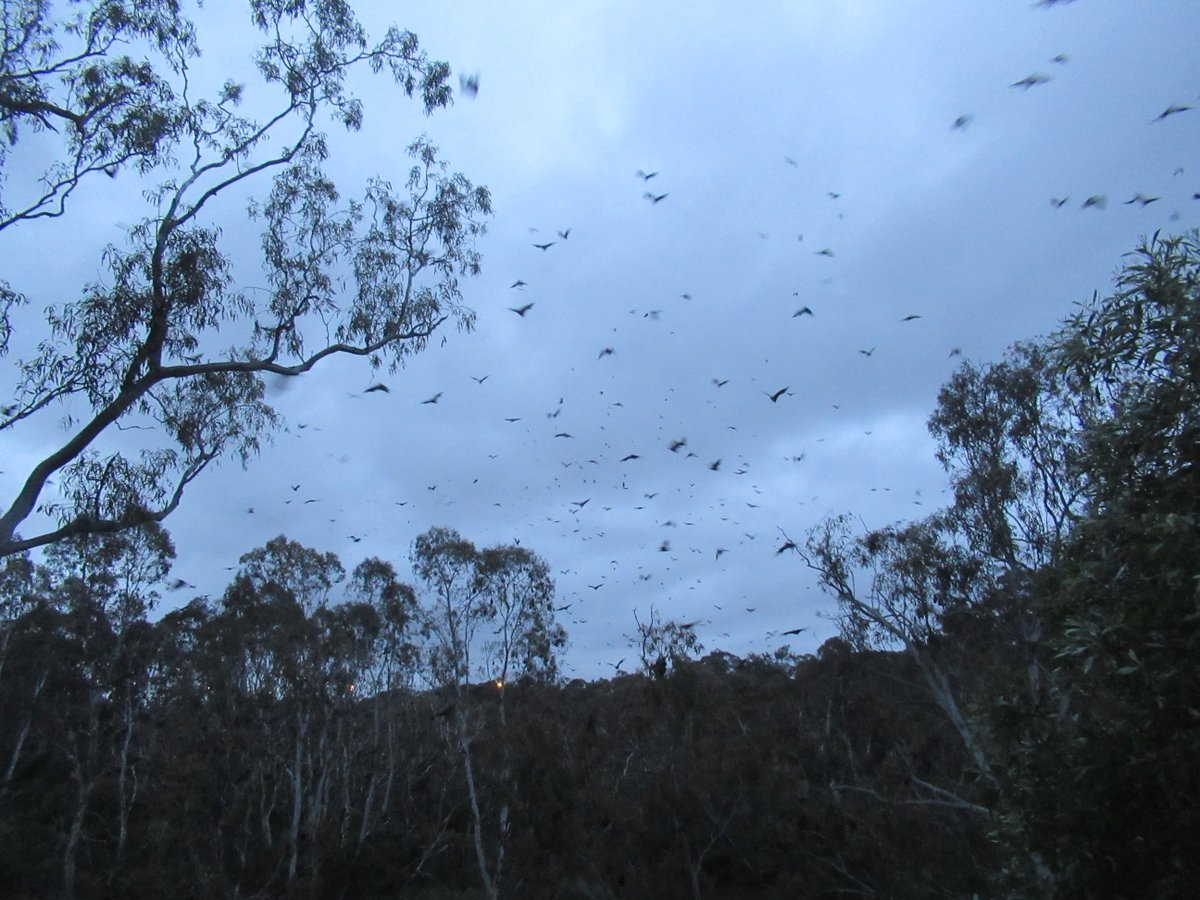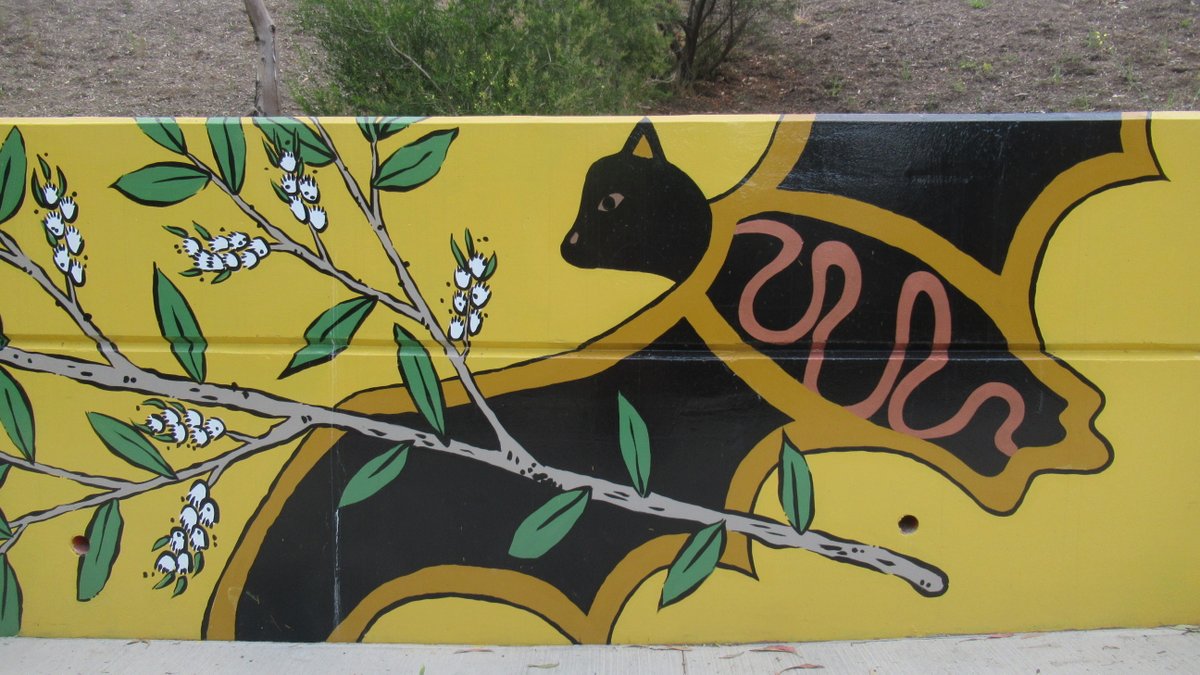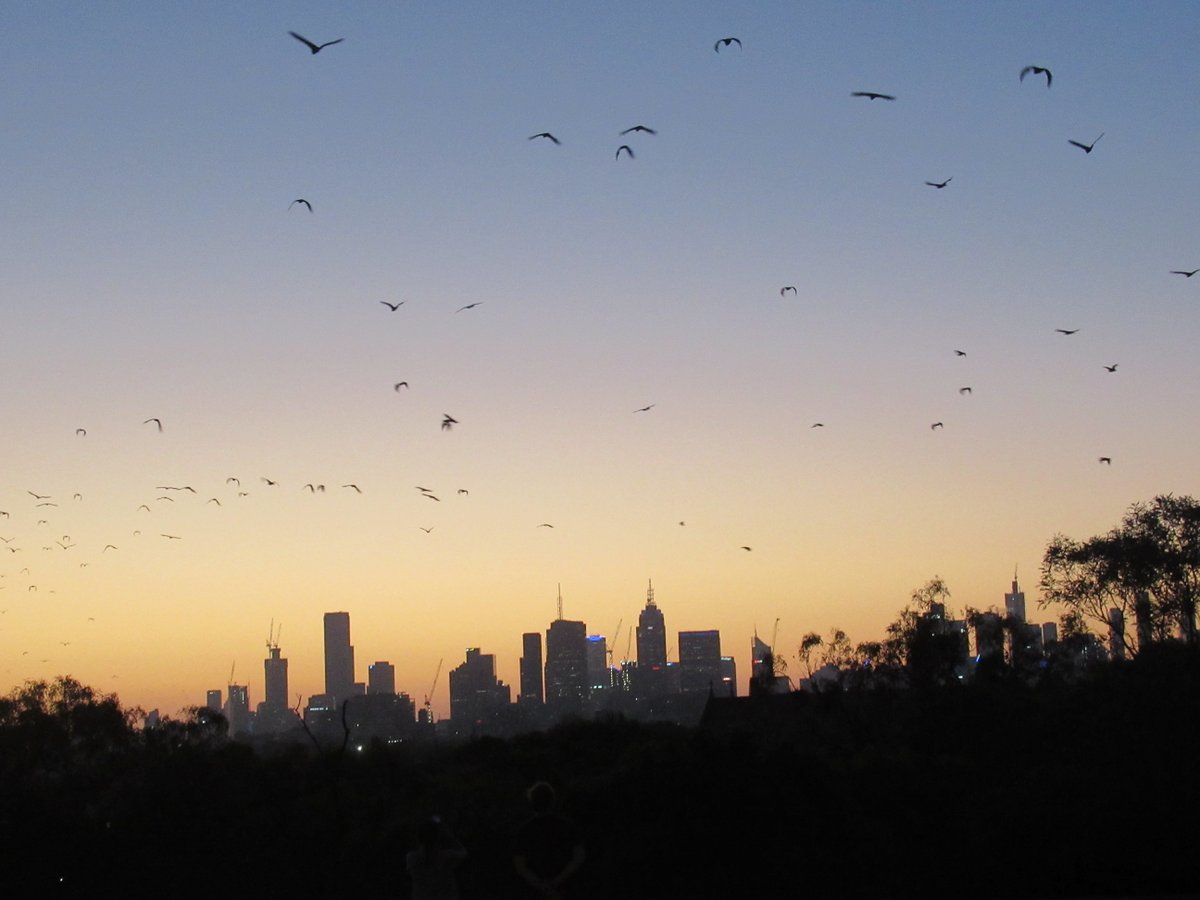Yes, bats belong in Melbourne too
Like the rest of the world, what I’ve been writing about has changed as a result of the ongoing Covid-19 pandemic. But I didn’t expect that would mean writing in defence of my favourite bat colony.
Melbourne is privileged to have a colony of flying foxes in a park by the Yarra close to the city. However, some residents have been worried by the risk of disease, so their MP has called for the colony to be moved on or culled. I don’t think anything is likely to come of it, but I still have strong feelings about it.
It’s in the news
Here’s the news clip I saw re-tweeted:
An outspoken Liberal MP is leading calls to move Melbourne's bat colony out of his Kew electorate. @andrew_lund #9News pic.twitter.com/7Po2m7qRmu
— Nine News Melbourne (@9NewsMelb) April 19, 2020
The Age also discussed it: Expert bats away call for ‘ridiculous’ cull of Yarra Bend flying foxes.
My personal stake
I first came across the colony when I was living nearby for a few months and decided to explore Yarra Bend Park. I’d occasionally seen bats as black shapes in the night sky, but had never seen them roosting.
And they just seemed such different creatures in the day-time. Yes, they may have wrapped themselves in large black wings, but they also turned out to have a beautiful red colour (hence the name “flying fox”):

And they were surprisingly active, too: Yes, most were sleeping, but there were so many in each tree that there were always some that were restless. They stretched their wings, they crawled up and down branches, and they squabbled with neighbouring bats. Sometimes they then reached harmony and settled down. Other times, one had to go find a better place to roost.
Then came the night. As sunset approached they began to get more active: stretching their wings, leaving their branches, and eventually circling round and flying off in groups both small and large. It was an amazing spectacle, and it’s one that I made sure I introduced interested siblings to.
Since the colony isn’t too far from my workplace, I’ve taken the opportunity to visit it sometimes in the summer when evenings are long. Most recently in December:

Each time I visit, I’m reminded how special it is that they’re there and that I’m able to watch them. I don’t need to control them or to dominate them, just accept them as they are.
It’s just another part of Australia’s amazing biodiversity that I’ve been fortunate enough to see in the wild. Maybe not quite as unusual as our many marsupials, but still an important part of our environment. And I was pleased last time I was there to see they’d even inspired some art nearby:

But bats carry diseases!
It seems most likely that the virus causing Covid-19 originated in bats in China before jumping to humans via some other intermediate animal. So it’s perhaps understandable that people have become increasingly fearful of bats. However, our flying foxes are a different species from the bats in China, and they live on a different continent, so it’s unlikely for them to carry a Covid-19 relative.
They are known to carry diseases, some of them serious. However, that is only a problem for direct human contact with them. Parks Victoria do advise avoiding touching them, but otherwise the risk of getting a disease from them is considered minimal, let alone that disease being able to spread person to person as Covid-19 can.
Personally, having watched them quite a few times, I don’t even know how you’d get close enough to them to allow direct contact.
The bats need our help
I know Covid-19 didn’t ask us first whether it was a convenient time for a pandemic, and that fears of disease then spread along with the virus. However, the timing of this particular call is really poor.
Bats across Australia’s entire east coast struggled in the summer, with a dangerous combination of hot days and bushfires. Melbourne’s colony won’t have been so affected by bushfires, though the bats are migratory. And I know on some of the hotter days the colony was being hosed to try and keep them cool. However, they were still subject to significant heat stress and they lost around 1/6 of their population over the summer.
Even before that, the flying foxes were listed as a vulnerable species, and the colony is living in protected native parkland. To even suggest a cull in these conditions shows someone who is seriously out of touch. I assume (and hope) that there are many checks and balances in place that will make this impossible, which is why I said I don’t expect anything to come of it.
Yes, bats are useful
Our flying foxes are fruit bats, which means they are important pollinators. They contribute to the maintenance of native forests, as well as of the fruit trees grown in gardens across the suburbs of Melbourne. If we lost them, there would be consequences.
It isn’t just about being useful to humans
However, while it’s worth considering what bats do for us, I don’t think that’s the most important reason for caring. They exist as part of a larger ecosystem, and “being useful to humans” is not their main purpose. Reducing it to a simple utilitarian calculation misses so much about what’s important about them.
I think the words of Mark Carwardine in Last Chance to See apply here:
There is one last reason for caring, and I believe no other reason is necessary. It is certainly the reason why so many people have devoted their lives to protecting the likes of rhinos, parakeets, kakapos and dolphins. And it is simply this: the world would be a poorer, darker, lonelier place without them.
I firmly believe Melbourne would be a poorer place without our fruit bat colony. Not just because we would lose an important pollinator, but because they belong.
A sunset picture
Last year I was on the border of Yarra Bend Park looking toward the city, and took this photo of a summer sunset:

And I love it because of how many different things it could show: It could show how close to the city the park actually is. It could show how much we have changed the landscape in less than 200 years. It could show an example of one of our cities co-existing with native animals. It could show the beauty of the natural world, or perhaps just the colour of the sunset.
A bigger problem
This post may have been triggered by Melbourne’s flying fox colony, but it isn’t just about Melbourne, and it isn’t just about bats. Covid-19 isn’t the only disease that has jumped from animals to humans in the last century. According to the CDC, 3 out of every 4 new or emerging infectious diseases come from animals. As we humans continue to expand our domain, we come into increased contact with animals, and thus increase the risk of diseases jumping the gap.
In this case, the MP in question said:
These bats are too close to humans, therefore the bats must be moved.
However, I think this shows a problematic (though common) attitude: Humans are the boss, and everything else has to move on for our convenience. In this case, I think bats and humans should be able to peacefully co-exist. However, imagine we weren’t able to: Why should we think that it’s self-evident that it’s the bats that need to move on?
One resident was quoted as saying “They don’t belong in the suburbs”. But are they really in the suburbs? They may be surrounded by suburbs, but they are in remnant native bushland that just happens to be close to Melbourne city. What’s more, these bats have certainly been in Australia far longer than our neat, orderly suburbs have been.
It’s somewhat arrogant for us humans to then come along and say “We don’t care that you’ve been here for thousands of years. We’ve imposed our suburbs, so now we belong and you don’t. Bye! Was nice knowing you…”.
And yes, I do realise this implicates me too: I write this post from a comfortable house on a site that was doubtless bushland 150 years ago. As humans, we’ve made massive changes to the world, and many of those changes would be difficult to reverse. But that’s no excuse for continuing to expand our footprint and to relocate or destroy any animal communities that stand in our way.
Animals need advocates
In our current world, humans are in charge. I’ve written often about human ingenuity, and it has given us many remarkable achievements. But there have also been many consequences to the world around us, and we need to take some responsibility for this. When it comes to species survival, we have often ended up picking the winners and the losers - sometimes deliberately, often accidentally.
The MP in question may have thought it clever talking about bats not being constituents. After all, one of our important shared fictions is the importance of democracy: Roughly speaking, that every human vote counts, while the votes and perhaps the interests of plants and animals are irrelevant.
However, while bats may not be his constituents, I’d be pretty certain that he has constituents who love Yarra Bend, love having the colony there, and would be upset by them being moved.
Animals may not be able to vote - but we are able to vote (and agitate) on their behalf. Not just because their presence benefits us in so many ways, but because they belong.
When it comes to trying to do the right thing, simple democracy is not enough. Even if you get 99% of the (human) population in favour of a proposal, it still might not be the right thing to do.
We need regulations to protect wildlife and their homes. We need government agencies responsible for monitoring the health of ecosystems and speaking on their behalf. And we also need checks and balances to prevent these protections being stripped away in favour of humans. And it’s because of these kind of regulations in Australia that I don’t think this proposal will go anywhere.
However, I also think it’s important to recognise how profoundly human-centred the proposal is, and to acknowledge that the world doesn’t just revolve around us. Our fears and our ambitions shouldn’t be allowed to dictate which species live and where exactly we will deign to permit them to live.
The park should be there because it benefits humans - but also because it benefits native animals. Similarly, the bats should be protected and encouraged because their presence benefits humans - but also because they belong.
And long may they continue to belong.